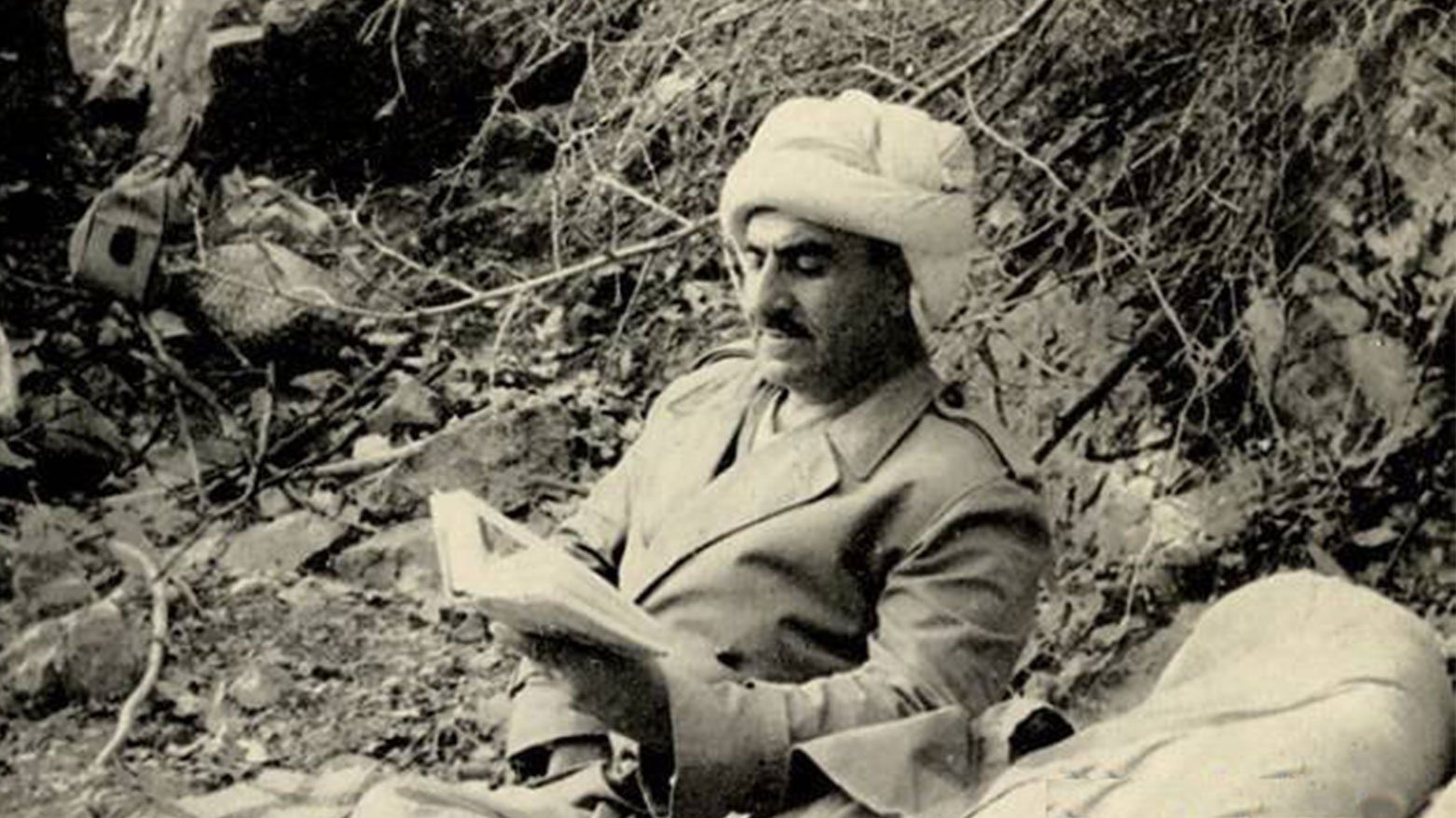
Yadgar Ismail
reporter
General Barzani: Championing Kurdish Autonomy in the Diplomatic Arena
"An Unheard Appeal to Kennedy, Cold War Geopolitics and the Intersection of Kurdish Rights"

In late 1963, during the Cold War and the presidency of the late John F. Kennedy, the spiritual leader of the Kurdish Nation, General Mustafa Barzani, head of the Kurdish freedom movement, wrote a letter to him that would leave a lasting mark on history. A letter recently appeared in Kurdish media, General Barzani called for solidarity and friendship with the United States, the leader of the free world, in hopes of finding peaceful solutions in post-colonial Iraq, denying Kurdish rights. General Barzani’s demands for the Kurds at the time were disciplined and profound: equal rights, freedom, and justice for the Kurdish people as defined under the United Nations’ Charter of Human Rights, who had long suffered under oppressive regimes in post-colonial Iraq. In the letter, General Barzani asked for support for the Kurdish people towards fulfilling legitimate human rights and respecting their heritage in their homeland, Kurdistan. He demanded recognition for the Kurdish people and their right to self-determination.
The letter, in part, was like a call for international solidarity between two peace-loving nations, the Americans and the Kurds. It was a diplomatic quest, a call for global attention, and a call for the superpowers to acknowledge the struggle of the Kurdish people. It was a demand that echoed the same sentiments that the Kurdish community continues to advocate and fight for today. General Barzani’s approach, however, was not based on or rooted in desperation or hatred; he advocated for fairness and a peaceful path to resolve the Kurdish struggle, a struggle that has been about equality and recognition in a post-colonial, post WWII world order in a world that ignored the Kurdish cause.
Engaging the Superpowers in A Diplomatic Appeal for Support
In his diplomatic mission, General Barzani did not limit his outreach to local or regional powers, he knew that securing Kurdish rights would require the attention and support of the world's superpowers. He was fully aware and had experienced through his historic exodus to the former Soviet Union, from which he had returned almost five years prior to the letter. His return to Iraq was based on an invitation from the post-monarchy regime that propagated for brotherhood of Arabs and Kurds, but as General Barzani mentioned in his letter to President Kennedy, Baghdad’s promises were not made to last.
As early as the 1960s, General Barzani tried to gain support from both the United States and the Soviet Union. At the time, the Soviet Union was considered an ally of the Kurdish people, however, its traditional foreign policy prevented it from direct support. General Barzani's diplomatic attempts proved crucial in maintaining the Kurdish fight for freedom, indicating his mature grasp of international politics and diplomacy.
General Barzani’s outreach to both the U.S. and the Soviet Union marked an early and significant moment in the internationalization of the Kurdish issue. General Barzani was never simply a local leader, but rather a transcultural and international leader whose vision transcended borders like his contemporaries of post-colonial thinkers and leaders. He understood that to secure Kurdish rights, he would need to navigate the complex and often risky world of international diplomacy. His relationships with these superpowers were rooted in the conviction that the Kurdish struggle deserved recognition not only as a regional matter but as a global issue concerning justice, equality, and the right to self-determination across a wide region of the Middle East. This vision was a realistic way to gain support from two of the superpowers within the United Nations, nations that carried the legacy of the League of Nations, an institution that had long overlooked the Kurdish aspirations for statehood from the 1920s and onwards.
The essence of General Barzani’s letter to President Kennedy
In his letter to the assassinated US President John F. Kennedy, General Barzani, the spiritual leader of the Kurdish nation, clarifies that the US president might have been aware of the situation of the Kurds in Iraq. Informs in the letter that they have been in negotiations with the Baghdad government for their rights under the Universal Declaration of Human Rights, as well as the right to self-determination within the framework of autonomy.
General Barzani reiterates that the regime has not changed anything in Iraq, as it has not changed till today, as is often criticized by the Kurdish public and leaders for being both centralized and ethnocentric. General Barzani, in his letter, clarifies that despite attempts for peace, they had to start a revolution against the centralist regime of Baghdad, as Abdul Karim Qasim had broken all of his promises, continued the brutal attacks. In addition, the Iraqi regime is compared to the Nazi regime by general Barzani as it implemented ruthless agendas degrading human dignity in 20the century let alone implementing a colonial policy of burnt land on Kurdistan territory.
The late Barzani also highlighted the denied rights of the Kurdish people, who have been constantly oppressed and received no assistance, and called for US support in defending the legitimate rights.
The letter expressed Barzani's deep understanding and analysis of the authorities in Baghdad. As expected by General Barzani, few other regimes have changed, and the main issues between then and now remain relatively unchanged due to the centralized governmentality based on religious motives opposing the legitimate rights of the Kurdish people. However, all their efforts, both past and present, have failed when measured against the vision and principles of General Barzani.
The Struggle for Kurdish Dignity
General Barzani’s personality was one of pragmatism and resilience with care and dedication. Unlike many of his contemporaries, he always preferred peace over war, as long as it was possible, but was never hesitant to defend his nation in a peshmerga style, brave and decisive. He never saw armed struggle as an objective; for him, it was a means only when all other means had been exhausted.
His commitment to peace was rooted in his deep understanding of his people's suffering. He believed that dialogue and diplomacy, a legacy well-preserved and manifested in Kurdistan Region and its leadership, as essential roadmaps to secure the future of Kurdistan and its people.
In 1974, when the Kurdistan Liberation Movement in the Autonomous Kurdish Region led by General Barzani faced fierce opposition from the central Iraqi government supported by regional states, yet again, General Barzani chose the safety and peace for his people.
Despite the mounting pressure, he never sought to victimize his people. His decision to engage in peace talks with Baghdad in 1974 showed his determination to protect his people from harm. Yet again, General Barzani chose another exodus to preserve the torch of freedom with his companions to shield his people from the devastating consequences of the broken Iraqi promises.
Exodus for Freedom
About two decades before the letter, General Barzani's exodus to the Soviet Union in 1947, following the collapse of the short-lived Kurdistan Republic in Mahabad, was a strategic move to keep the Kurdish freedom movement alive. With his companions, he took refuge in the Soviet Union, where they were able to regroup and continue their struggle for Kurdish rights in the face of mounting threats from Iraq and other neighboring states. This exodus, the first, was critical during a time of immense uncertainty, pressure, and oppression.
As far as the second exodus is concerned, General Barzani continued leading his people with unwavering dedication. His time in Iran was marked by illness and hardship. Despite the challenges, he kept the Kurdish cause alive, building alliances that would one day prove essential for the Kurdish struggle. The support of the Soviet Union and later Iran allowed the Kurdish issue to remain relevant on the global stage, two diplomatic successes, ensuring that the dream of Kurdish self-determination was never out of sight.
The general’s dignified departure in 1979 was not the end of his and the Kurdish dream. He passed away still fighting for the Kurdish cause, still breathing hope for a nation that had yet to see its freedom realized. His death, much like that of any great leader, marked the end of an era, but not the end of the struggle. He was the embodiment of resilience, a leader who put his people’s well-being and rights above everything else, much like the biblical figure Moses who led his people through hardship and toward a promised land, General Barzani led his nation’s aspirations over his shoulders across borders defying the world order for the rightful land and natural ownership of Kurdistan, the eternal home of the Kurds and other Kurdistani people.
The Legacy of General Barzani's Leadership
What made General Barzani truly unforgettable was not just his leadership; it was the kind of person he was: humble, honest, and deeply in tune with the hopes of his people. His life and struggle are not just part of Kurdish history; that beats in the heart of every Kurdish dream. What set him apart was his ability to hold onto hope and dignity, even in the hardest times. He was not a leader who sought power through force, but enforced the force of peace; he led with care, with a deep love for his people, and a true desire for peace and justice.
His efforts to reach out to world powers, his lifelong search for peace, and his constant dedication to his people’s cause helped shape the Kurdish struggle for more rights and achievements. Today, his message speaks louder than ever. The Kurdish cause is not just a local concern but is a call for justice that the world can no longer ignore. General Barzani’s legacy reminds us that the fight for dignity, freedom, and equality has no boundaries. The dream of a free and thriving Kurdistan is still alive; his life is proof of the strength and resilience of the Kurdish people and is a reminder that no matter how many challenges come, standing up for justice and dignity is always worth it.
Disclaimer: the views and opinions expressed in this article are those of the author and do not explicitly and/or necessarily reflect the views and opinions of Kurdistan24.